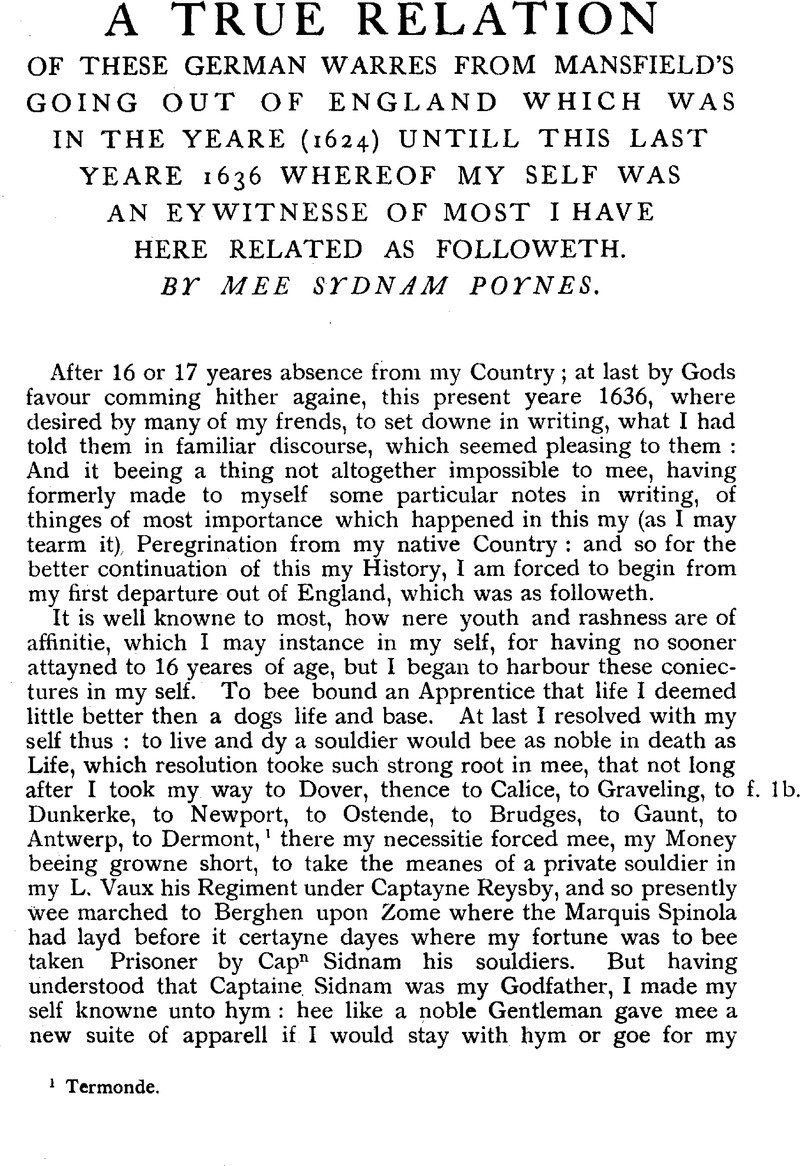No CrossRef data available.
Published online by Cambridge University Press: 24 December 2009

page 45 note 1 Termonde.
page 46 note 1 Probably William Baillie ‘ colonel of Dutch ’ and afterwards Lieutenant-General in Scotland. Monro spells him as here ‘ Baily ’.
page 46 note 2 Gertruydenberg.
page 46 note 3 Dongen. Theatrum Europœum, i, 837.
page 46 note 4 Dieren.
page 47 note 1 A mistake probably for Sir John Leslie ‘ Lieutenant Colonel of Sir John Ruthven's Regiment of Dutch’. Grant Memoirs of Hepburn p. 254.
page 47 note 2 John Ernest the younger. See Introduction.
page 47 note 3 A lacuna without reason. ‘Stift Bremen’ is meant.
page 47 note 4 Osterburg.
page 47 note 5 Stendal.
page 47 note 6 Tangermünde.
page 47 note 7 Rogäz. See Introduction.
page 47 note 8 Dessau.
page 47 note 9 Havelberg.
page 48 note 1 Crossen.
page 48 note 2 Breslau.
page 48 note 3 ? Popelau near Oppeln, or even Oppeln itself.
page 48 note 4 Tarnowitz.
page 48 note 5 Teschen. See Introduction.
page 48 note 6 Olmütz.
page 48 note 7 Probably Weisskirchen.
page 48 note 8 ? Sandilands of Torphichen : see Introduction.
page 48 note 9 ?Malaczka.
page 49 note 1 Troppau.
page 49 note 2 Jägerndorf.
page 49 note 3 It is the Pasha of Belgrade who is afterwards accused of assassinating Mansfeld.
page 49 note 4 Levenez or Levencz in the county of Bars. Polamia, afterwards called Polava, cannot be identified. It was somewhere between Levencz and Novigrad.
page 51 note 1 Wisgrad.
page 51 note 2 The Hungarian name of Erlau.
page 51 note 3 Dervish.
page 52 note 1 An ‘asper’ was but the third of a penny in value: he probably means ‘Piastres’.
page 53 note 1 An unfulfilled promise.
page 55 note 1 Dresden.
page 55 note 2 Peenemunde.
page 56 note 1 Mecklenburg.
page 56 note 2 Greiffenhagen.
page 56 note 3 Custrin.
page 56 note 4 Garz.
page 56 note 5 Landsberg on the Wartha.
page 56 note 6 Sparre. He was not killed, but made prisoner.
page 56 note 7 Preussen (Prussia).
page 56 note 8 Afterwards commandant of Hanau.
page 56 note 9 There seem to have been two Wallensteins in the Swedish service, cf. the list of regiments in Droysen. Gustaf Adolf 2, p. 464 note.
page 57 note 1 Harte i pp. 374–5 Poyntz' chronology is hopelessly confused
page 57 note 2 Eilenburg.
page 58 note 1 Eilenburg again.
page 58 note 2 Tilly fled to Halle: Pappenheira to Mansfeld. Villermont, Tilly 2, p. 182 ; Harte, i, p. 421.
page 59 note 1 Thüringen.
page 60 note 1 The name is for once correct. It is sometimes given as ‘Wrangel’.
page 60 note 2 See Introduction.
page 60 note 3 This is absurd : the King entered from the North-East : the Castle is West of the city.
page 60 note 4 The word seems inexplicable, but plainly some form of shelter is meant. ‘Châteaux’ has been suggested as an obscure military term of the period, but such use lacks confirmation.
page 61 note 1 Keller.
page 61 note 2 Some words seem to be omitted: probably ‘[the cause] of so great an encrease.’
page 63 note 1 Windsheim. Monro calls it Vintzin.
page 63 note 2 Dinkelsbühl.
page 63 note 3 Nördlingen.
page 64 note 1 Rain.
page 64 note 2 Lech.
page 66 note 1 See the Introduction.
page 69 note 1 Marradas.
page 69 note 2 Elbogen.
page 70 note 1 Starschedel (?) Theatrum Europœum, 2, p. 652.
page 71 note 1 Oelsnitz.
page 71 note 2 Plauen.
page 71 note 3 Hof.
page 71 note 4 Zwickau.
page 71 note 5 Chemnitz.
page 71 note 6 Weissenfels.
page 71 note 7 George, not William.
page 72 note 1 Halle.
page 72 note 2 See the Introduction.
page 74 note 1 It is difficult to say who are meant by these names : Huskirk may be Hofkirch. The rest are uncertain. ‘ Young Grave Coronell Tirskey ’ may be a description of some cadet of the Trczka family. Wallenstein spared no man in his wrath. But Khevenhüller's list (XII. 495) contains no such names.
page 74 note 2 Cf. Harte, ii, p. 268 note and perhaps the letter from Lilly in Harte, Appendix II.